Leadership and Management in Service Sector: The Savoy Hotel Analysis
VerifiedAdded on 2022/11/30
|11
|3635
|308
Report
AI Summary
This report offers a comprehensive analysis of leadership and management within the service industry, using The Savoy Hotel as a central case study. It begins by exploring classical management theories and different leadership styles, including democratic, transformational, and autocratic approaches, and how they are applied in the context of the hotel. The report then delves into the internal and external factors that shape management styles and structures, such as globalization, motivation, environmental impacts, and cultural influences. Furthermore, it examines the current 'hard' and 'soft' skills essential for effective management and leadership, including technical, management, computer, and project management skills, alongside communication, teamwork, and problem-solving abilities. The report also touches upon the future skills required by the service sector. The report includes an introduction, task-based analysis, and a conclusion. Overall, this report provides a detailed overview of leadership and management practices in the service sector, offering valuable insights for industry professionals and students alike.
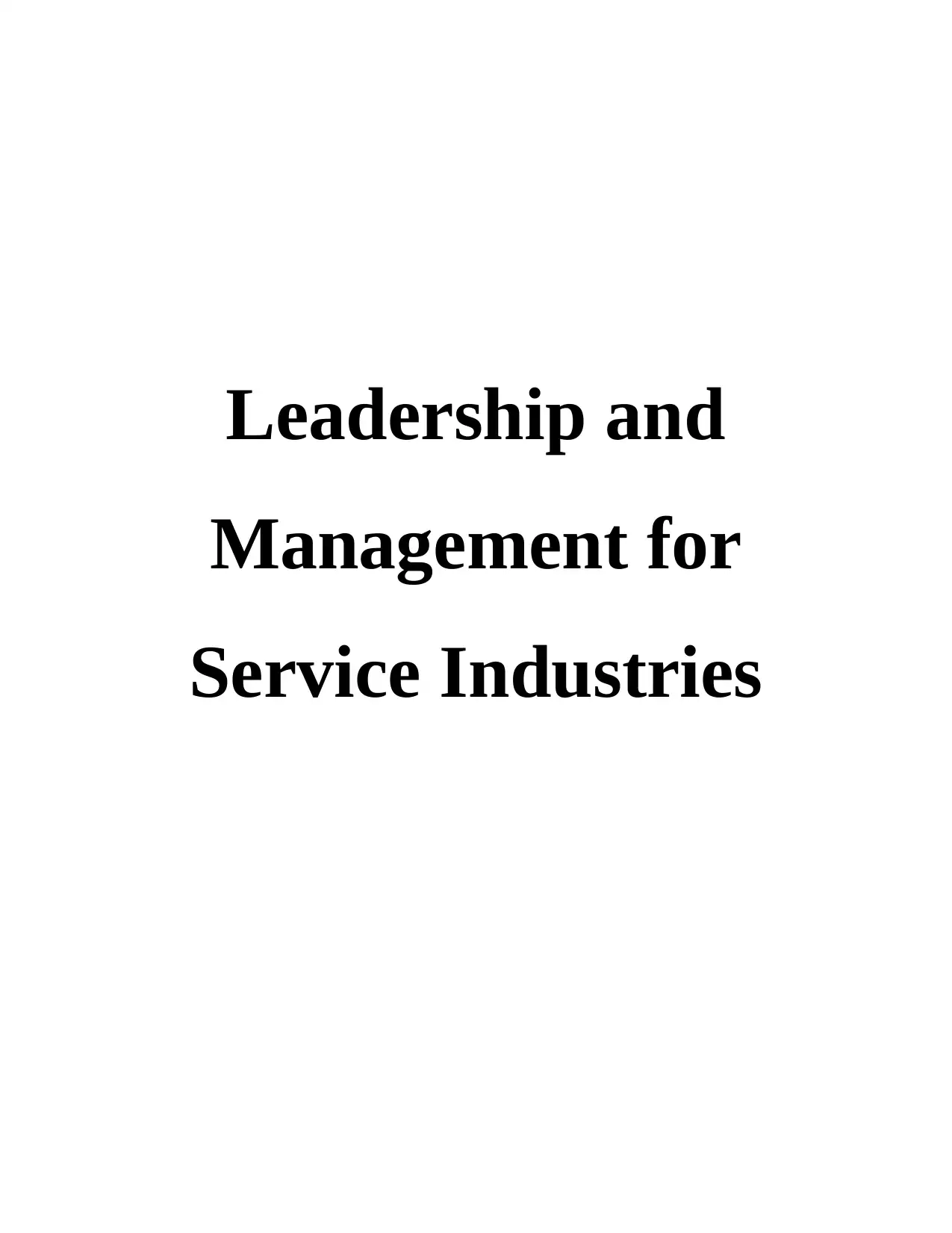
Leadership and
Management for
Service Industries
Management for
Service Industries
Paraphrase This Document
Need a fresh take? Get an instant paraphrase of this document with our AI Paraphraser
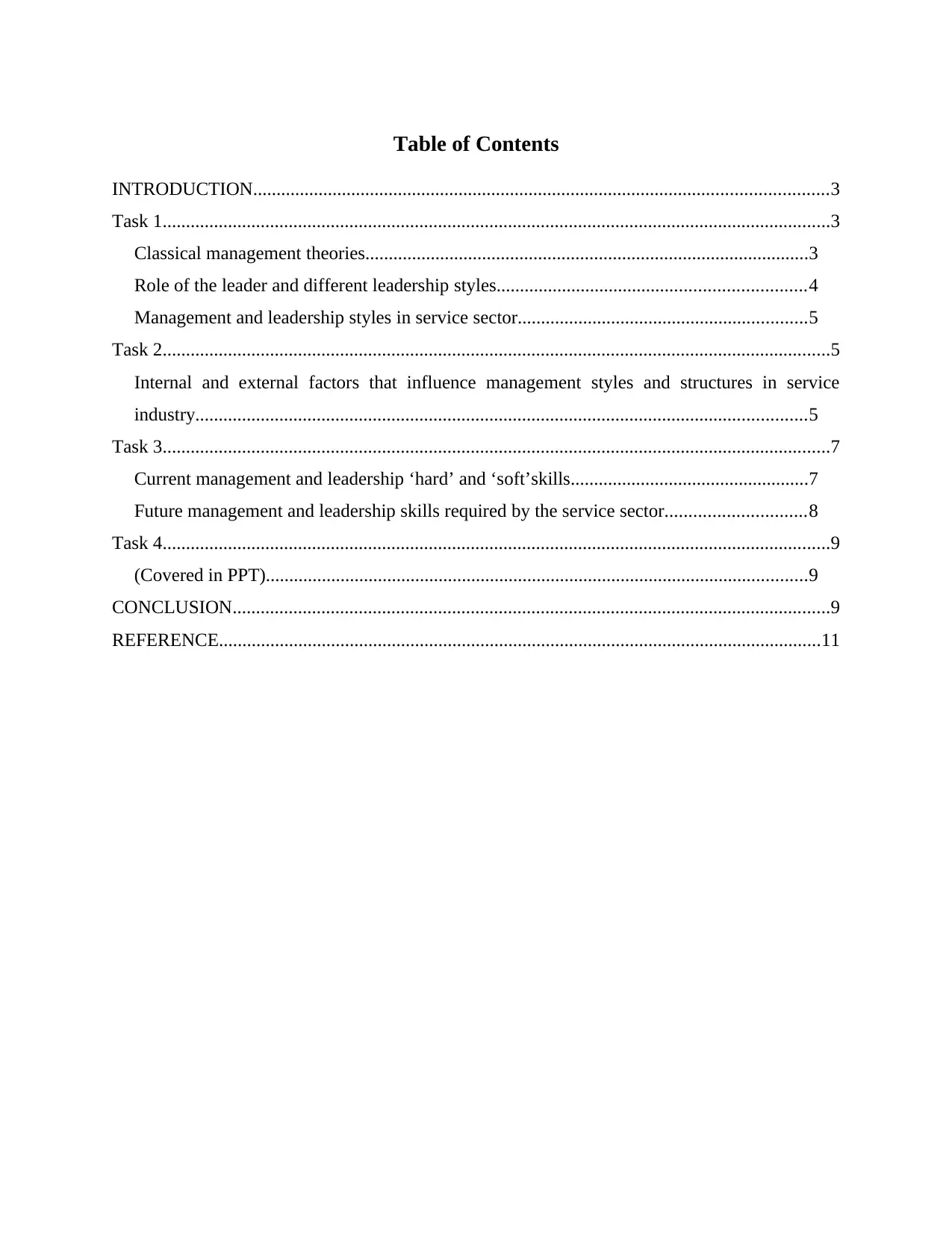
Table of Contents
INTRODUCTION...........................................................................................................................3
Task 1...............................................................................................................................................3
Classical management theories...............................................................................................3
Role of the leader and different leadership styles..................................................................4
Management and leadership styles in service sector..............................................................5
Task 2...............................................................................................................................................5
Internal and external factors that influence management styles and structures in service
industry...................................................................................................................................5
Task 3...............................................................................................................................................7
Current management and leadership ‘hard’ and ‘soft’skills...................................................7
Future management and leadership skills required by the service sector..............................8
Task 4...............................................................................................................................................9
(Covered in PPT)....................................................................................................................9
CONCLUSION................................................................................................................................9
REFERENCE.................................................................................................................................11
INTRODUCTION...........................................................................................................................3
Task 1...............................................................................................................................................3
Classical management theories...............................................................................................3
Role of the leader and different leadership styles..................................................................4
Management and leadership styles in service sector..............................................................5
Task 2...............................................................................................................................................5
Internal and external factors that influence management styles and structures in service
industry...................................................................................................................................5
Task 3...............................................................................................................................................7
Current management and leadership ‘hard’ and ‘soft’skills...................................................7
Future management and leadership skills required by the service sector..............................8
Task 4...............................................................................................................................................9
(Covered in PPT)....................................................................................................................9
CONCLUSION................................................................................................................................9
REFERENCE.................................................................................................................................11
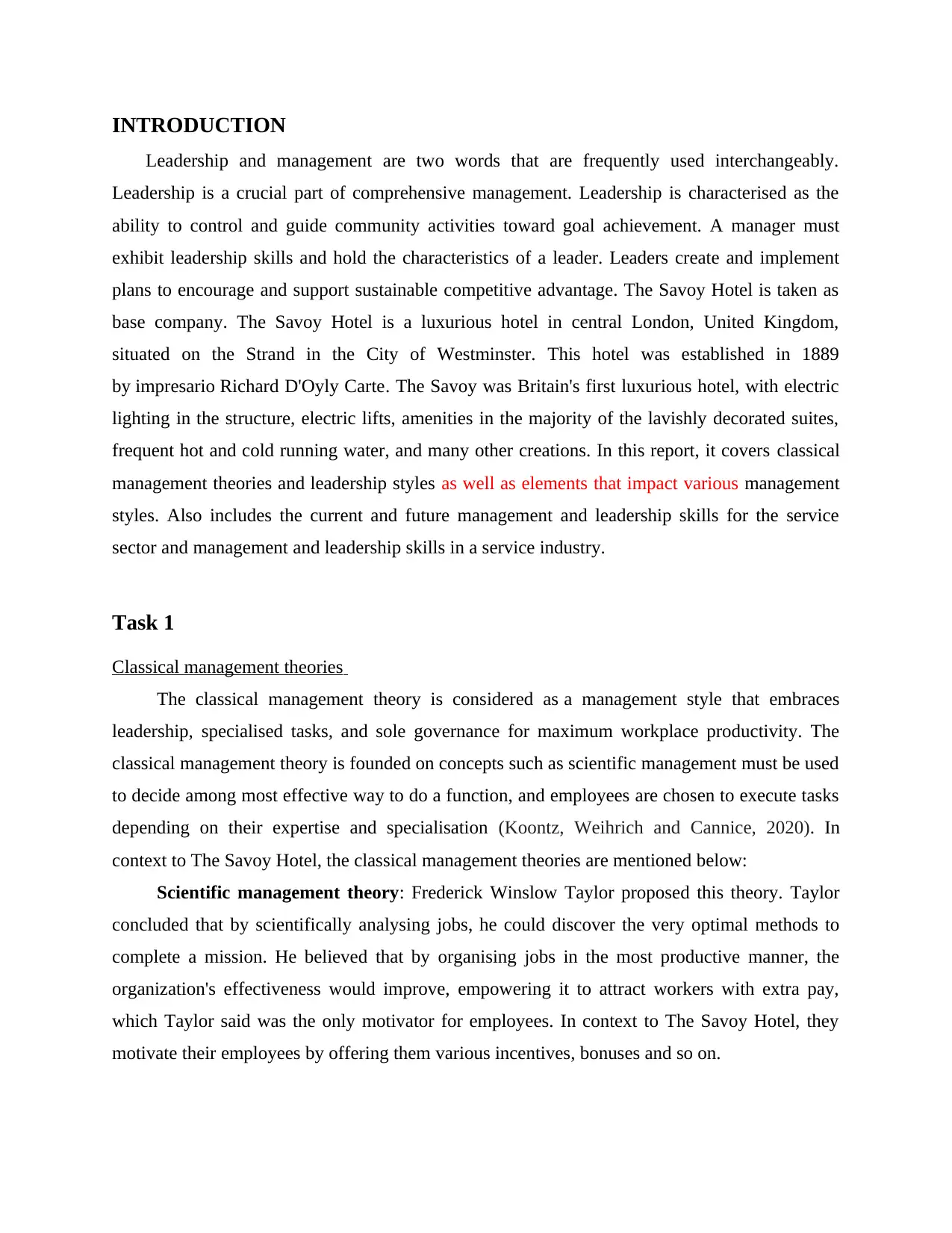
INTRODUCTION
Leadership and management are two words that are frequently used interchangeably.
Leadership is a crucial part of comprehensive management. Leadership is characterised as the
ability to control and guide community activities toward goal achievement. A manager must
exhibit leadership skills and hold the characteristics of a leader. Leaders create and implement
plans to encourage and support sustainable competitive advantage. The Savoy Hotel is taken as
base company. The Savoy Hotel is a luxurious hotel in central London, United Kingdom,
situated on the Strand in the City of Westminster. This hotel was established in 1889
by impresario Richard D'Oyly Carte. The Savoy was Britain's first luxurious hotel, with electric
lighting in the structure, electric lifts, amenities in the majority of the lavishly decorated suites,
frequent hot and cold running water, and many other creations. In this report, it covers classical
management theories and leadership styles as well as elements that impact various management
styles. Also includes the current and future management and leadership skills for the service
sector and management and leadership skills in a service industry.
Task 1
Classical management theories
The classical management theory is considered as a management style that embraces
leadership, specialised tasks, and sole governance for maximum workplace productivity. The
classical management theory is founded on concepts such as scientific management must be used
to decide among most effective way to do a function, and employees are chosen to execute tasks
depending on their expertise and specialisation (Koontz, Weihrich and Cannice, 2020). In
context to The Savoy Hotel, the classical management theories are mentioned below:
Scientific management theory: Frederick Winslow Taylor proposed this theory. Taylor
concluded that by scientifically analysing jobs, he could discover the very optimal methods to
complete a mission. He believed that by organising jobs in the most productive manner, the
organization's effectiveness would improve, empowering it to attract workers with extra pay,
which Taylor said was the only motivator for employees. In context to The Savoy Hotel, they
motivate their employees by offering them various incentives, bonuses and so on.
Leadership and management are two words that are frequently used interchangeably.
Leadership is a crucial part of comprehensive management. Leadership is characterised as the
ability to control and guide community activities toward goal achievement. A manager must
exhibit leadership skills and hold the characteristics of a leader. Leaders create and implement
plans to encourage and support sustainable competitive advantage. The Savoy Hotel is taken as
base company. The Savoy Hotel is a luxurious hotel in central London, United Kingdom,
situated on the Strand in the City of Westminster. This hotel was established in 1889
by impresario Richard D'Oyly Carte. The Savoy was Britain's first luxurious hotel, with electric
lighting in the structure, electric lifts, amenities in the majority of the lavishly decorated suites,
frequent hot and cold running water, and many other creations. In this report, it covers classical
management theories and leadership styles as well as elements that impact various management
styles. Also includes the current and future management and leadership skills for the service
sector and management and leadership skills in a service industry.
Task 1
Classical management theories
The classical management theory is considered as a management style that embraces
leadership, specialised tasks, and sole governance for maximum workplace productivity. The
classical management theory is founded on concepts such as scientific management must be used
to decide among most effective way to do a function, and employees are chosen to execute tasks
depending on their expertise and specialisation (Koontz, Weihrich and Cannice, 2020). In
context to The Savoy Hotel, the classical management theories are mentioned below:
Scientific management theory: Frederick Winslow Taylor proposed this theory. Taylor
concluded that by scientifically analysing jobs, he could discover the very optimal methods to
complete a mission. He believed that by organising jobs in the most productive manner, the
organization's effectiveness would improve, empowering it to attract workers with extra pay,
which Taylor said was the only motivator for employees. In context to The Savoy Hotel, they
motivate their employees by offering them various incentives, bonuses and so on.
⊘ This is a preview!⊘
Do you want full access?
Subscribe today to unlock all pages.

Trusted by 1+ million students worldwide
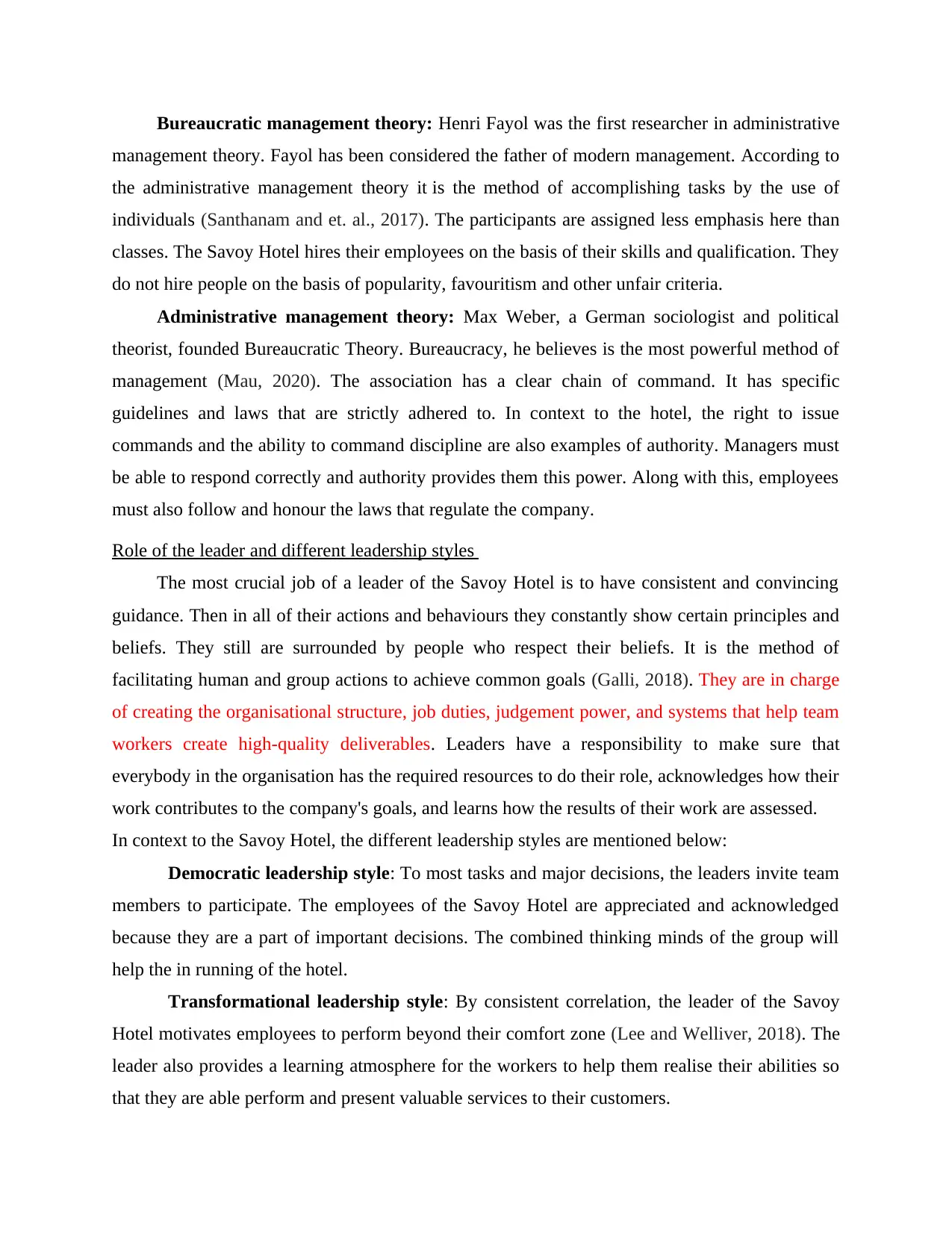
Bureaucratic management theory: Henri Fayol was the first researcher in administrative
management theory. Fayol has been considered the father of modern management. According to
the administrative management theory it is the method of accomplishing tasks by the use of
individuals (Santhanam and et. al., 2017). The participants are assigned less emphasis here than
classes. The Savoy Hotel hires their employees on the basis of their skills and qualification. They
do not hire people on the basis of popularity, favouritism and other unfair criteria.
Administrative management theory: Max Weber, a German sociologist and political
theorist, founded Bureaucratic Theory. Bureaucracy, he believes is the most powerful method of
management (Mau, 2020). The association has a clear chain of command. It has specific
guidelines and laws that are strictly adhered to. In context to the hotel, the right to issue
commands and the ability to command discipline are also examples of authority. Managers must
be able to respond correctly and authority provides them this power. Along with this, employees
must also follow and honour the laws that regulate the company.
Role of the leader and different leadership styles
The most crucial job of a leader of the Savoy Hotel is to have consistent and convincing
guidance. Then in all of their actions and behaviours they constantly show certain principles and
beliefs. They still are surrounded by people who respect their beliefs. It is the method of
facilitating human and group actions to achieve common goals (Galli, 2018). They are in charge
of creating the organisational structure, job duties, judgement power, and systems that help team
workers create high-quality deliverables. Leaders have a responsibility to make sure that
everybody in the organisation has the required resources to do their role, acknowledges how their
work contributes to the company's goals, and learns how the results of their work are assessed.
In context to the Savoy Hotel, the different leadership styles are mentioned below:
Democratic leadership style: To most tasks and major decisions, the leaders invite team
members to participate. The employees of the Savoy Hotel are appreciated and acknowledged
because they are a part of important decisions. The combined thinking minds of the group will
help the in running of the hotel.
Transformational leadership style: By consistent correlation, the leader of the Savoy
Hotel motivates employees to perform beyond their comfort zone (Lee and Welliver, 2018). The
leader also provides a learning atmosphere for the workers to help them realise their abilities so
that they are able perform and present valuable services to their customers.
management theory. Fayol has been considered the father of modern management. According to
the administrative management theory it is the method of accomplishing tasks by the use of
individuals (Santhanam and et. al., 2017). The participants are assigned less emphasis here than
classes. The Savoy Hotel hires their employees on the basis of their skills and qualification. They
do not hire people on the basis of popularity, favouritism and other unfair criteria.
Administrative management theory: Max Weber, a German sociologist and political
theorist, founded Bureaucratic Theory. Bureaucracy, he believes is the most powerful method of
management (Mau, 2020). The association has a clear chain of command. It has specific
guidelines and laws that are strictly adhered to. In context to the hotel, the right to issue
commands and the ability to command discipline are also examples of authority. Managers must
be able to respond correctly and authority provides them this power. Along with this, employees
must also follow and honour the laws that regulate the company.
Role of the leader and different leadership styles
The most crucial job of a leader of the Savoy Hotel is to have consistent and convincing
guidance. Then in all of their actions and behaviours they constantly show certain principles and
beliefs. They still are surrounded by people who respect their beliefs. It is the method of
facilitating human and group actions to achieve common goals (Galli, 2018). They are in charge
of creating the organisational structure, job duties, judgement power, and systems that help team
workers create high-quality deliverables. Leaders have a responsibility to make sure that
everybody in the organisation has the required resources to do their role, acknowledges how their
work contributes to the company's goals, and learns how the results of their work are assessed.
In context to the Savoy Hotel, the different leadership styles are mentioned below:
Democratic leadership style: To most tasks and major decisions, the leaders invite team
members to participate. The employees of the Savoy Hotel are appreciated and acknowledged
because they are a part of important decisions. The combined thinking minds of the group will
help the in running of the hotel.
Transformational leadership style: By consistent correlation, the leader of the Savoy
Hotel motivates employees to perform beyond their comfort zone (Lee and Welliver, 2018). The
leader also provides a learning atmosphere for the workers to help them realise their abilities so
that they are able perform and present valuable services to their customers.
Paraphrase This Document
Need a fresh take? Get an instant paraphrase of this document with our AI Paraphraser
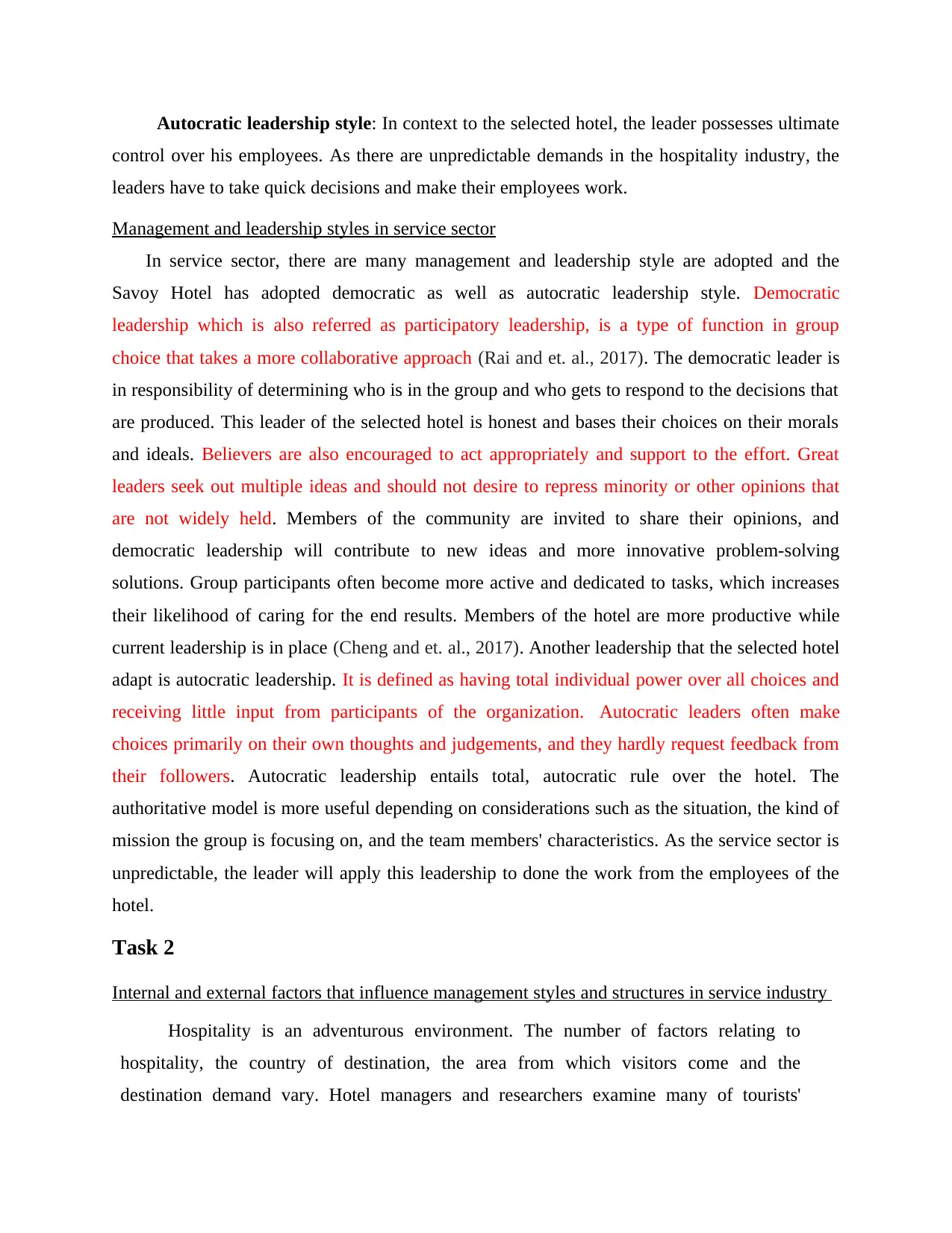
Autocratic leadership style: In context to the selected hotel, the leader possesses ultimate
control over his employees. As there are unpredictable demands in the hospitality industry, the
leaders have to take quick decisions and make their employees work.
Management and leadership styles in service sector
In service sector, there are many management and leadership style are adopted and the
Savoy Hotel has adopted democratic as well as autocratic leadership style. Democratic
leadership which is also referred as participatory leadership, is a type of function in group
choice that takes a more collaborative approach (Rai and et. al., 2017). The democratic leader is
in responsibility of determining who is in the group and who gets to respond to the decisions that
are produced. This leader of the selected hotel is honest and bases their choices on their morals
and ideals. Believers are also encouraged to act appropriately and support to the effort. Great
leaders seek out multiple ideas and should not desire to repress minority or other opinions that
are not widely held. Members of the community are invited to share their opinions, and
democratic leadership will contribute to new ideas and more innovative problem-solving
solutions. Group participants often become more active and dedicated to tasks, which increases
their likelihood of caring for the end results. Members of the hotel are more productive while
current leadership is in place (Cheng and et. al., 2017). Another leadership that the selected hotel
adapt is autocratic leadership. It is defined as having total individual power over all choices and
receiving little input from participants of the organization. Autocratic leaders often make
choices primarily on their own thoughts and judgements, and they hardly request feedback from
their followers. Autocratic leadership entails total, autocratic rule over the hotel. The
authoritative model is more useful depending on considerations such as the situation, the kind of
mission the group is focusing on, and the team members' characteristics. As the service sector is
unpredictable, the leader will apply this leadership to done the work from the employees of the
hotel.
Task 2
Internal and external factors that influence management styles and structures in service industry
Hospitality is an adventurous environment. The number of factors relating to
hospitality, the country of destination, the area from which visitors come and the
destination demand vary. Hotel managers and researchers examine many of tourists'
control over his employees. As there are unpredictable demands in the hospitality industry, the
leaders have to take quick decisions and make their employees work.
Management and leadership styles in service sector
In service sector, there are many management and leadership style are adopted and the
Savoy Hotel has adopted democratic as well as autocratic leadership style. Democratic
leadership which is also referred as participatory leadership, is a type of function in group
choice that takes a more collaborative approach (Rai and et. al., 2017). The democratic leader is
in responsibility of determining who is in the group and who gets to respond to the decisions that
are produced. This leader of the selected hotel is honest and bases their choices on their morals
and ideals. Believers are also encouraged to act appropriately and support to the effort. Great
leaders seek out multiple ideas and should not desire to repress minority or other opinions that
are not widely held. Members of the community are invited to share their opinions, and
democratic leadership will contribute to new ideas and more innovative problem-solving
solutions. Group participants often become more active and dedicated to tasks, which increases
their likelihood of caring for the end results. Members of the hotel are more productive while
current leadership is in place (Cheng and et. al., 2017). Another leadership that the selected hotel
adapt is autocratic leadership. It is defined as having total individual power over all choices and
receiving little input from participants of the organization. Autocratic leaders often make
choices primarily on their own thoughts and judgements, and they hardly request feedback from
their followers. Autocratic leadership entails total, autocratic rule over the hotel. The
authoritative model is more useful depending on considerations such as the situation, the kind of
mission the group is focusing on, and the team members' characteristics. As the service sector is
unpredictable, the leader will apply this leadership to done the work from the employees of the
hotel.
Task 2
Internal and external factors that influence management styles and structures in service industry
Hospitality is an adventurous environment. The number of factors relating to
hospitality, the country of destination, the area from which visitors come and the
destination demand vary. Hotel managers and researchers examine many of tourists'
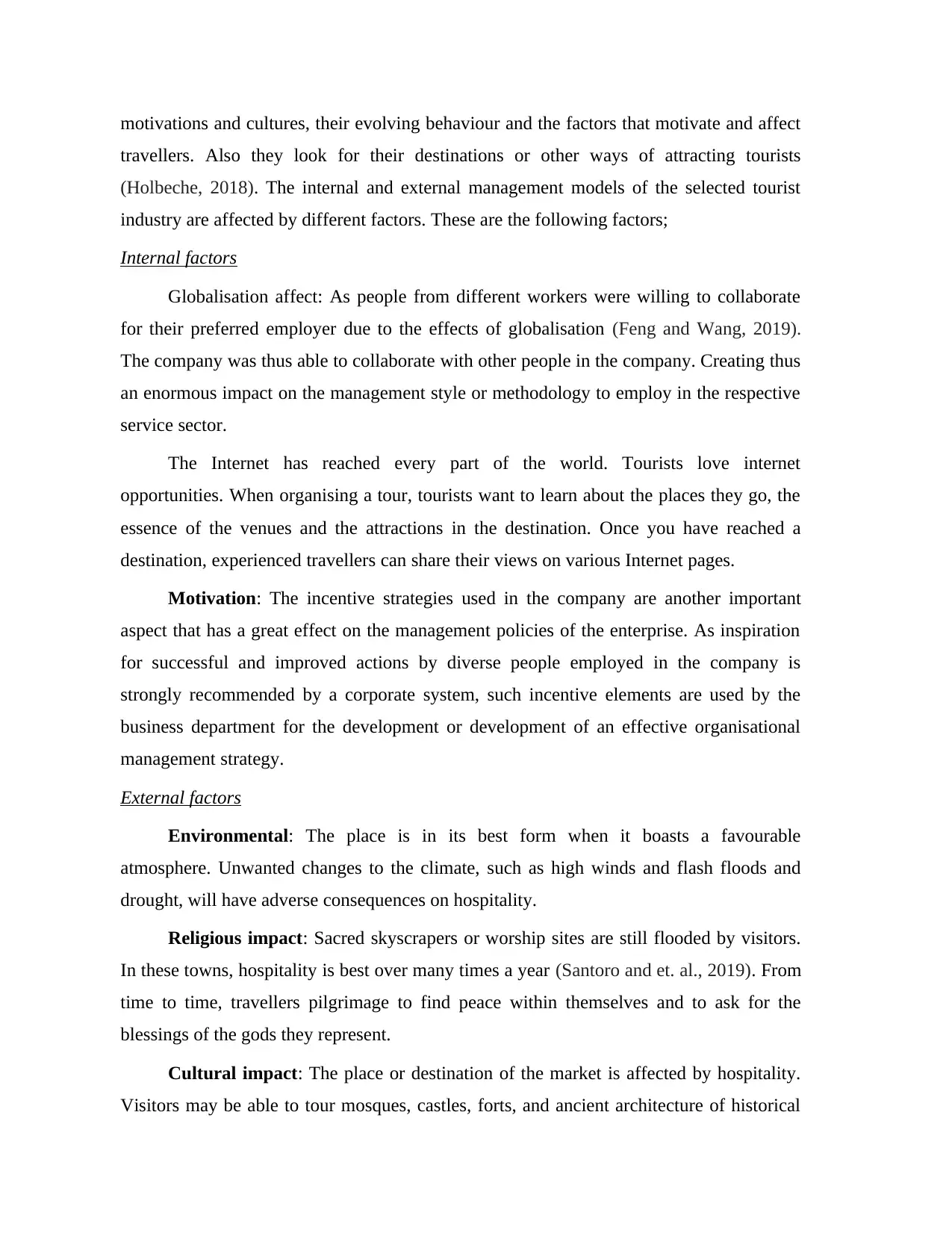
motivations and cultures, their evolving behaviour and the factors that motivate and affect
travellers. Also they look for their destinations or other ways of attracting tourists
(Holbeche, 2018). The internal and external management models of the selected tourist
industry are affected by different factors. These are the following factors;
Internal factors
Globalisation affect: As people from different workers were willing to collaborate
for their preferred employer due to the effects of globalisation (Feng and Wang, 2019).
The company was thus able to collaborate with other people in the company. Creating thus
an enormous impact on the management style or methodology to employ in the respective
service sector.
The Internet has reached every part of the world. Tourists love internet
opportunities. When organising a tour, tourists want to learn about the places they go, the
essence of the venues and the attractions in the destination. Once you have reached a
destination, experienced travellers can share their views on various Internet pages.
Motivation: The incentive strategies used in the company are another important
aspect that has a great effect on the management policies of the enterprise. As inspiration
for successful and improved actions by diverse people employed in the company is
strongly recommended by a corporate system, such incentive elements are used by the
business department for the development or development of an effective organisational
management strategy.
External factors
Environmental: The place is in its best form when it boasts a favourable
atmosphere. Unwanted changes to the climate, such as high winds and flash floods and
drought, will have adverse consequences on hospitality.
Religious impact: Sacred skyscrapers or worship sites are still flooded by visitors.
In these towns, hospitality is best over many times a year (Santoro and et. al., 2019). From
time to time, travellers pilgrimage to find peace within themselves and to ask for the
blessings of the gods they represent.
Cultural impact: The place or destination of the market is affected by hospitality.
Visitors may be able to tour mosques, castles, forts, and ancient architecture of historical
travellers. Also they look for their destinations or other ways of attracting tourists
(Holbeche, 2018). The internal and external management models of the selected tourist
industry are affected by different factors. These are the following factors;
Internal factors
Globalisation affect: As people from different workers were willing to collaborate
for their preferred employer due to the effects of globalisation (Feng and Wang, 2019).
The company was thus able to collaborate with other people in the company. Creating thus
an enormous impact on the management style or methodology to employ in the respective
service sector.
The Internet has reached every part of the world. Tourists love internet
opportunities. When organising a tour, tourists want to learn about the places they go, the
essence of the venues and the attractions in the destination. Once you have reached a
destination, experienced travellers can share their views on various Internet pages.
Motivation: The incentive strategies used in the company are another important
aspect that has a great effect on the management policies of the enterprise. As inspiration
for successful and improved actions by diverse people employed in the company is
strongly recommended by a corporate system, such incentive elements are used by the
business department for the development or development of an effective organisational
management strategy.
External factors
Environmental: The place is in its best form when it boasts a favourable
atmosphere. Unwanted changes to the climate, such as high winds and flash floods and
drought, will have adverse consequences on hospitality.
Religious impact: Sacred skyscrapers or worship sites are still flooded by visitors.
In these towns, hospitality is best over many times a year (Santoro and et. al., 2019). From
time to time, travellers pilgrimage to find peace within themselves and to ask for the
blessings of the gods they represent.
Cultural impact: The place or destination of the market is affected by hospitality.
Visitors may be able to tour mosques, castles, forts, and ancient architecture of historical
⊘ This is a preview!⊘
Do you want full access?
Subscribe today to unlock all pages.

Trusted by 1+ million students worldwide
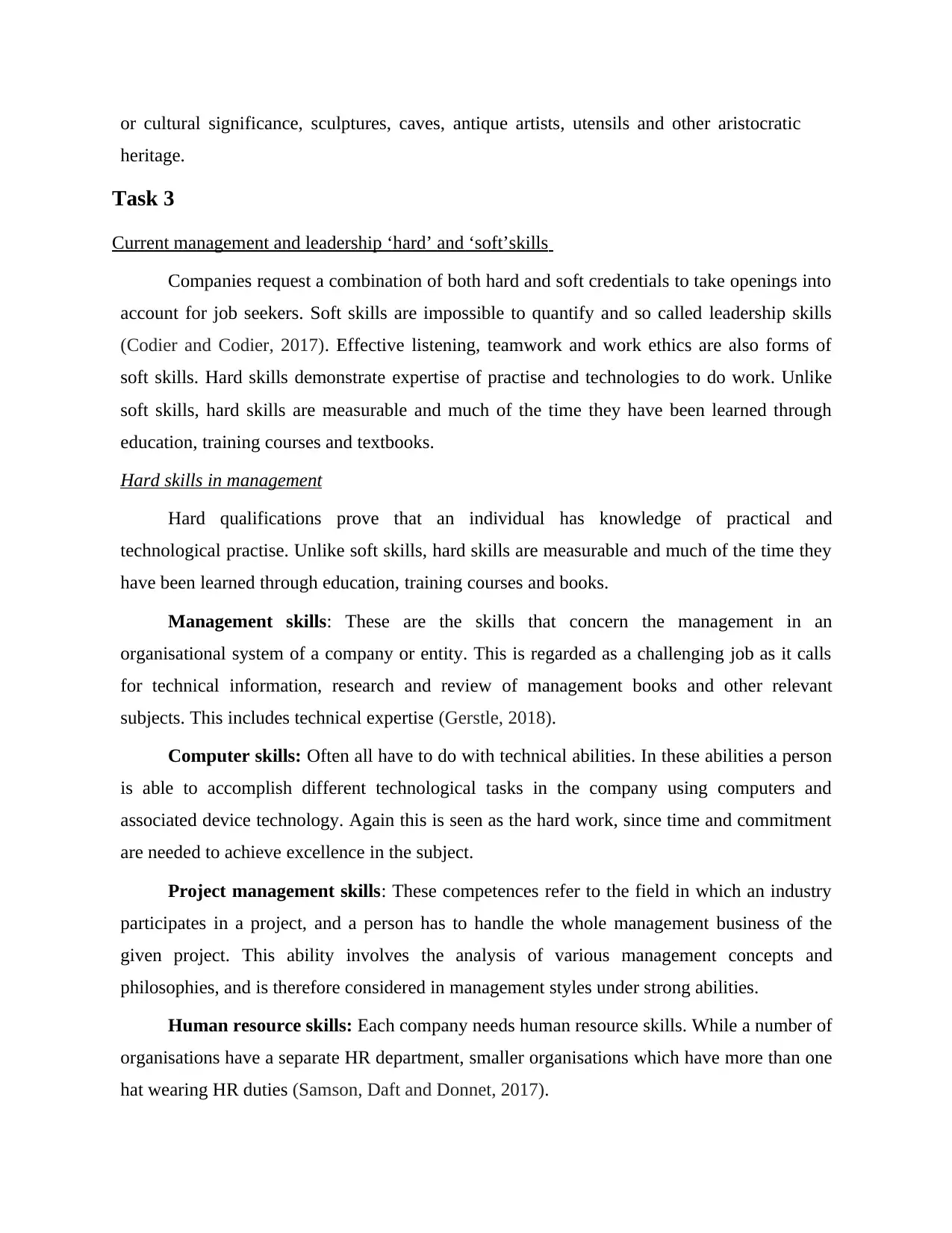
or cultural significance, sculptures, caves, antique artists, utensils and other aristocratic
heritage.
Task 3
Current management and leadership ‘hard’ and ‘soft’skills
Companies request a combination of both hard and soft credentials to take openings into
account for job seekers. Soft skills are impossible to quantify and so called leadership skills
(Codier and Codier, 2017). Effective listening, teamwork and work ethics are also forms of
soft skills. Hard skills demonstrate expertise of practise and technologies to do work. Unlike
soft skills, hard skills are measurable and much of the time they have been learned through
education, training courses and textbooks.
Hard skills in management
Hard qualifications prove that an individual has knowledge of practical and
technological practise. Unlike soft skills, hard skills are measurable and much of the time they
have been learned through education, training courses and books.
Management skills: These are the skills that concern the management in an
organisational system of a company or entity. This is regarded as a challenging job as it calls
for technical information, research and review of management books and other relevant
subjects. This includes technical expertise (Gerstle, 2018).
Computer skills: Often all have to do with technical abilities. In these abilities a person
is able to accomplish different technological tasks in the company using computers and
associated device technology. Again this is seen as the hard work, since time and commitment
are needed to achieve excellence in the subject.
Project management skills: These competences refer to the field in which an industry
participates in a project, and a person has to handle the whole management business of the
given project. This ability involves the analysis of various management concepts and
philosophies, and is therefore considered in management styles under strong abilities.
Human resource skills: Each company needs human resource skills. While a number of
organisations have a separate HR department, smaller organisations which have more than one
hat wearing HR duties (Samson, Daft and Donnet, 2017).
heritage.
Task 3
Current management and leadership ‘hard’ and ‘soft’skills
Companies request a combination of both hard and soft credentials to take openings into
account for job seekers. Soft skills are impossible to quantify and so called leadership skills
(Codier and Codier, 2017). Effective listening, teamwork and work ethics are also forms of
soft skills. Hard skills demonstrate expertise of practise and technologies to do work. Unlike
soft skills, hard skills are measurable and much of the time they have been learned through
education, training courses and textbooks.
Hard skills in management
Hard qualifications prove that an individual has knowledge of practical and
technological practise. Unlike soft skills, hard skills are measurable and much of the time they
have been learned through education, training courses and books.
Management skills: These are the skills that concern the management in an
organisational system of a company or entity. This is regarded as a challenging job as it calls
for technical information, research and review of management books and other relevant
subjects. This includes technical expertise (Gerstle, 2018).
Computer skills: Often all have to do with technical abilities. In these abilities a person
is able to accomplish different technological tasks in the company using computers and
associated device technology. Again this is seen as the hard work, since time and commitment
are needed to achieve excellence in the subject.
Project management skills: These competences refer to the field in which an industry
participates in a project, and a person has to handle the whole management business of the
given project. This ability involves the analysis of various management concepts and
philosophies, and is therefore considered in management styles under strong abilities.
Human resource skills: Each company needs human resource skills. While a number of
organisations have a separate HR department, smaller organisations which have more than one
hat wearing HR duties (Samson, Daft and Donnet, 2017).
Paraphrase This Document
Need a fresh take? Get an instant paraphrase of this document with our AI Paraphraser
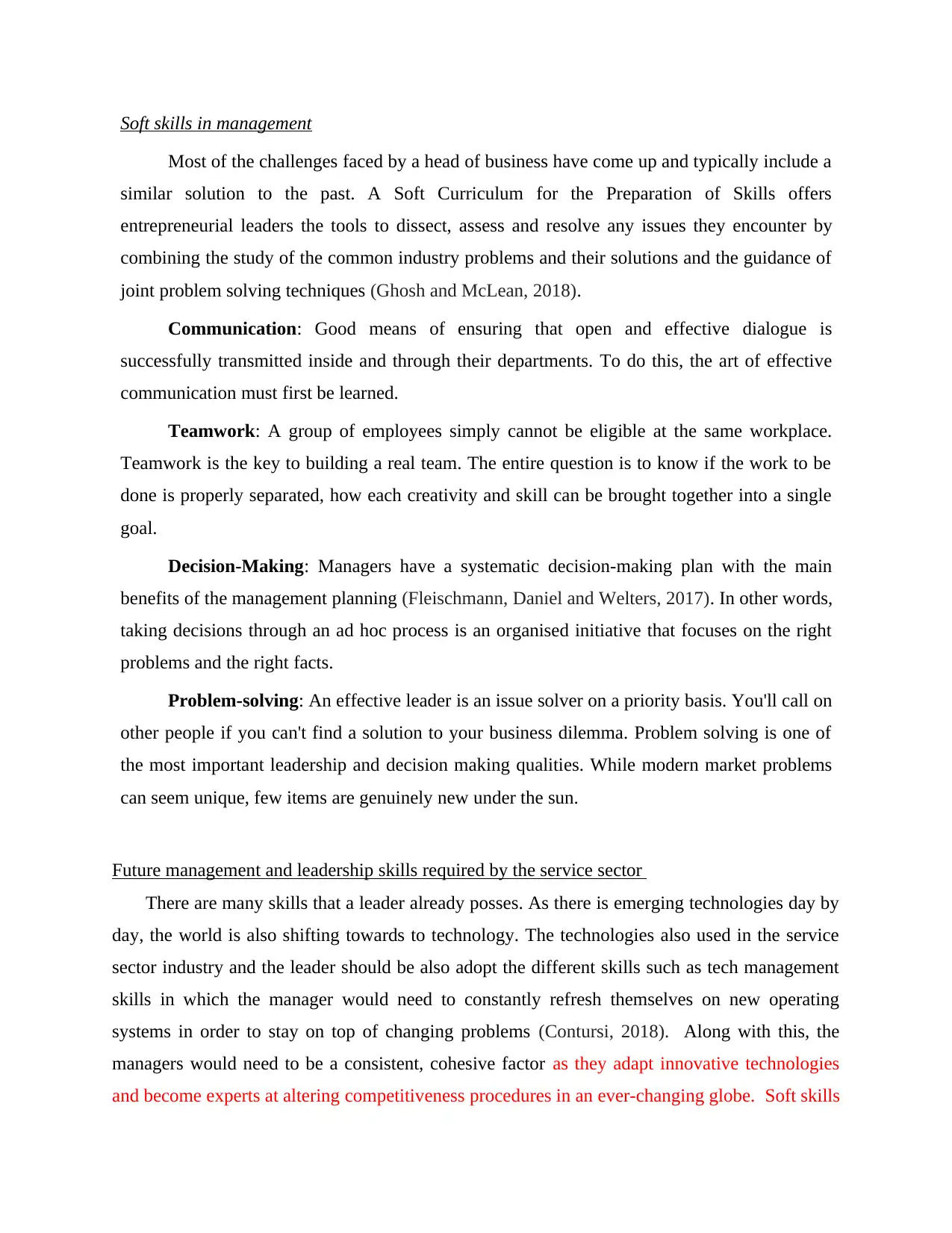
Soft skills in management
Most of the challenges faced by a head of business have come up and typically include a
similar solution to the past. A Soft Curriculum for the Preparation of Skills offers
entrepreneurial leaders the tools to dissect, assess and resolve any issues they encounter by
combining the study of the common industry problems and their solutions and the guidance of
joint problem solving techniques (Ghosh and McLean, 2018).
Communication: Good means of ensuring that open and effective dialogue is
successfully transmitted inside and through their departments. To do this, the art of effective
communication must first be learned.
Teamwork: A group of employees simply cannot be eligible at the same workplace.
Teamwork is the key to building a real team. The entire question is to know if the work to be
done is properly separated, how each creativity and skill can be brought together into a single
goal.
Decision-Making: Managers have a systematic decision-making plan with the main
benefits of the management planning (Fleischmann, Daniel and Welters, 2017). In other words,
taking decisions through an ad hoc process is an organised initiative that focuses on the right
problems and the right facts.
Problem-solving: An effective leader is an issue solver on a priority basis. You'll call on
other people if you can't find a solution to your business dilemma. Problem solving is one of
the most important leadership and decision making qualities. While modern market problems
can seem unique, few items are genuinely new under the sun.
Future management and leadership skills required by the service sector
There are many skills that a leader already posses. As there is emerging technologies day by
day, the world is also shifting towards to technology. The technologies also used in the service
sector industry and the leader should be also adopt the different skills such as tech management
skills in which the manager would need to constantly refresh themselves on new operating
systems in order to stay on top of changing problems (Contursi, 2018). Along with this, the
managers would need to be a consistent, cohesive factor as they adapt innovative technologies
and become experts at altering competitiveness procedures in an ever-changing globe. Soft skills
Most of the challenges faced by a head of business have come up and typically include a
similar solution to the past. A Soft Curriculum for the Preparation of Skills offers
entrepreneurial leaders the tools to dissect, assess and resolve any issues they encounter by
combining the study of the common industry problems and their solutions and the guidance of
joint problem solving techniques (Ghosh and McLean, 2018).
Communication: Good means of ensuring that open and effective dialogue is
successfully transmitted inside and through their departments. To do this, the art of effective
communication must first be learned.
Teamwork: A group of employees simply cannot be eligible at the same workplace.
Teamwork is the key to building a real team. The entire question is to know if the work to be
done is properly separated, how each creativity and skill can be brought together into a single
goal.
Decision-Making: Managers have a systematic decision-making plan with the main
benefits of the management planning (Fleischmann, Daniel and Welters, 2017). In other words,
taking decisions through an ad hoc process is an organised initiative that focuses on the right
problems and the right facts.
Problem-solving: An effective leader is an issue solver on a priority basis. You'll call on
other people if you can't find a solution to your business dilemma. Problem solving is one of
the most important leadership and decision making qualities. While modern market problems
can seem unique, few items are genuinely new under the sun.
Future management and leadership skills required by the service sector
There are many skills that a leader already posses. As there is emerging technologies day by
day, the world is also shifting towards to technology. The technologies also used in the service
sector industry and the leader should be also adopt the different skills such as tech management
skills in which the manager would need to constantly refresh themselves on new operating
systems in order to stay on top of changing problems (Contursi, 2018). Along with this, the
managers would need to be a consistent, cohesive factor as they adapt innovative technologies
and become experts at altering competitiveness procedures in an ever-changing globe. Soft skills
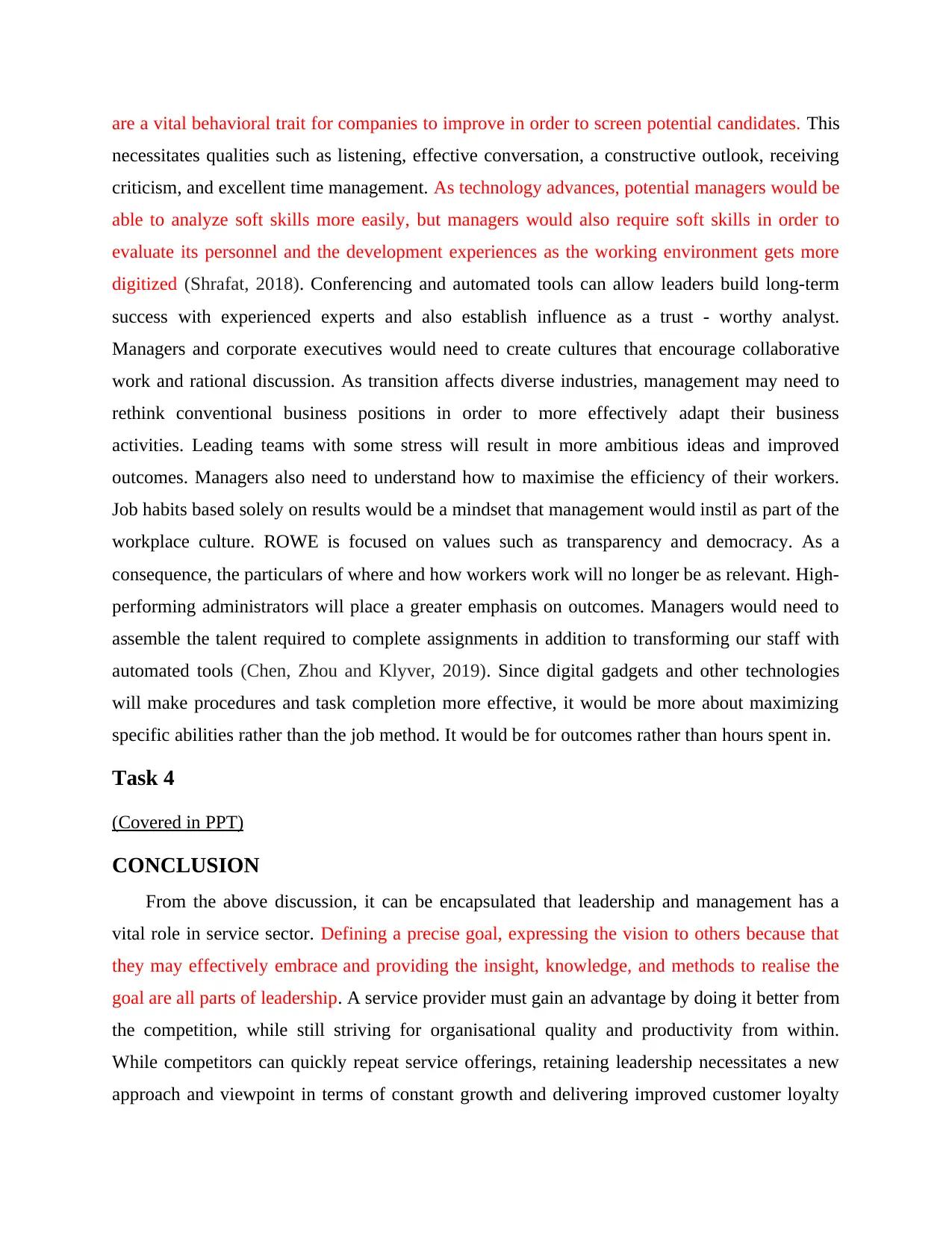
are a vital behavioral trait for companies to improve in order to screen potential candidates. This
necessitates qualities such as listening, effective conversation, a constructive outlook, receiving
criticism, and excellent time management. As technology advances, potential managers would be
able to analyze soft skills more easily, but managers would also require soft skills in order to
evaluate its personnel and the development experiences as the working environment gets more
digitized (Shrafat, 2018). Conferencing and automated tools can allow leaders build long-term
success with experienced experts and also establish influence as a trust - worthy analyst.
Managers and corporate executives would need to create cultures that encourage collaborative
work and rational discussion. As transition affects diverse industries, management may need to
rethink conventional business positions in order to more effectively adapt their business
activities. Leading teams with some stress will result in more ambitious ideas and improved
outcomes. Managers also need to understand how to maximise the efficiency of their workers.
Job habits based solely on results would be a mindset that management would instil as part of the
workplace culture. ROWE is focused on values such as transparency and democracy. As a
consequence, the particulars of where and how workers work will no longer be as relevant. High-
performing administrators will place a greater emphasis on outcomes. Managers would need to
assemble the talent required to complete assignments in addition to transforming our staff with
automated tools (Chen, Zhou and Klyver, 2019). Since digital gadgets and other technologies
will make procedures and task completion more effective, it would be more about maximizing
specific abilities rather than the job method. It would be for outcomes rather than hours spent in.
Task 4
(Covered in PPT)
CONCLUSION
From the above discussion, it can be encapsulated that leadership and management has a
vital role in service sector. Defining a precise goal, expressing the vision to others because that
they may effectively embrace and providing the insight, knowledge, and methods to realise the
goal are all parts of leadership. A service provider must gain an advantage by doing it better from
the competition, while still striving for organisational quality and productivity from within.
While competitors can quickly repeat service offerings, retaining leadership necessitates a new
approach and viewpoint in terms of constant growth and delivering improved customer loyalty
necessitates qualities such as listening, effective conversation, a constructive outlook, receiving
criticism, and excellent time management. As technology advances, potential managers would be
able to analyze soft skills more easily, but managers would also require soft skills in order to
evaluate its personnel and the development experiences as the working environment gets more
digitized (Shrafat, 2018). Conferencing and automated tools can allow leaders build long-term
success with experienced experts and also establish influence as a trust - worthy analyst.
Managers and corporate executives would need to create cultures that encourage collaborative
work and rational discussion. As transition affects diverse industries, management may need to
rethink conventional business positions in order to more effectively adapt their business
activities. Leading teams with some stress will result in more ambitious ideas and improved
outcomes. Managers also need to understand how to maximise the efficiency of their workers.
Job habits based solely on results would be a mindset that management would instil as part of the
workplace culture. ROWE is focused on values such as transparency and democracy. As a
consequence, the particulars of where and how workers work will no longer be as relevant. High-
performing administrators will place a greater emphasis on outcomes. Managers would need to
assemble the talent required to complete assignments in addition to transforming our staff with
automated tools (Chen, Zhou and Klyver, 2019). Since digital gadgets and other technologies
will make procedures and task completion more effective, it would be more about maximizing
specific abilities rather than the job method. It would be for outcomes rather than hours spent in.
Task 4
(Covered in PPT)
CONCLUSION
From the above discussion, it can be encapsulated that leadership and management has a
vital role in service sector. Defining a precise goal, expressing the vision to others because that
they may effectively embrace and providing the insight, knowledge, and methods to realise the
goal are all parts of leadership. A service provider must gain an advantage by doing it better from
the competition, while still striving for organisational quality and productivity from within.
While competitors can quickly repeat service offerings, retaining leadership necessitates a new
approach and viewpoint in terms of constant growth and delivering improved customer loyalty
⊘ This is a preview!⊘
Do you want full access?
Subscribe today to unlock all pages.

Trusted by 1+ million students worldwide
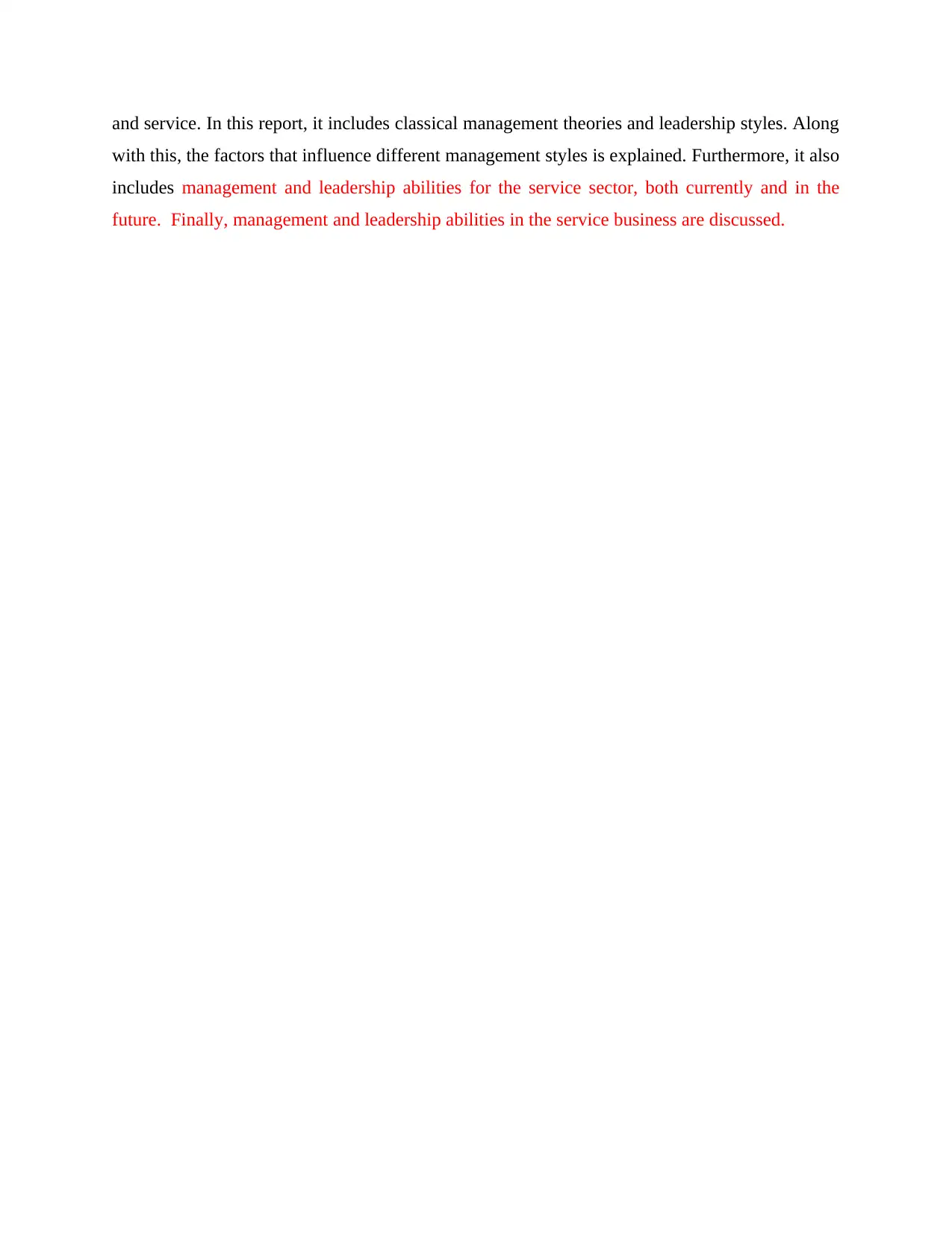
and service. In this report, it includes classical management theories and leadership styles. Along
with this, the factors that influence different management styles is explained. Furthermore, it also
includes management and leadership abilities for the service sector, both currently and in the
future. Finally, management and leadership abilities in the service business are discussed.
with this, the factors that influence different management styles is explained. Furthermore, it also
includes management and leadership abilities for the service sector, both currently and in the
future. Finally, management and leadership abilities in the service business are discussed.
Paraphrase This Document
Need a fresh take? Get an instant paraphrase of this document with our AI Paraphraser
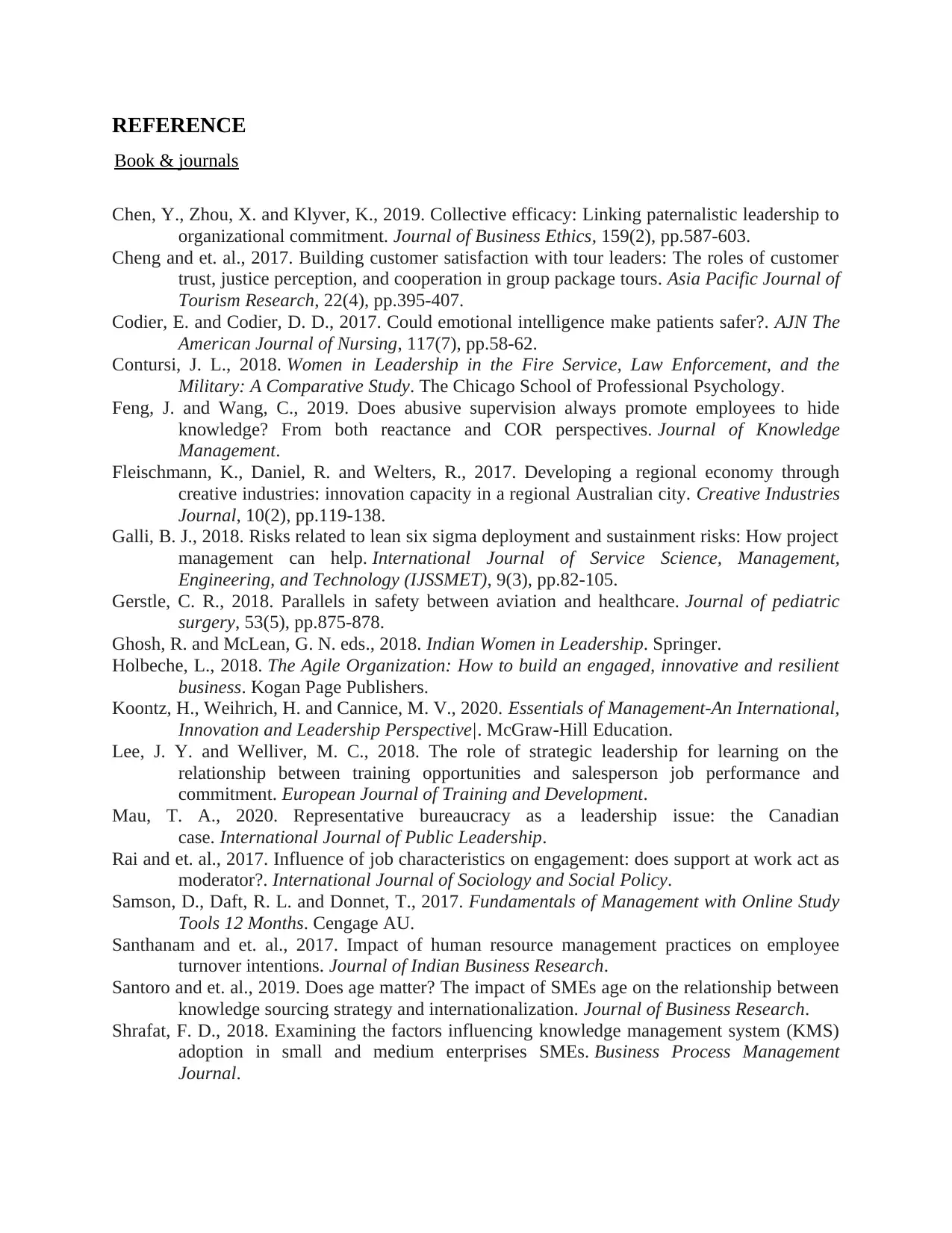
REFERENCE
Book & journals
Chen, Y., Zhou, X. and Klyver, K., 2019. Collective efficacy: Linking paternalistic leadership to
organizational commitment. Journal of Business Ethics, 159(2), pp.587-603.
Cheng and et. al., 2017. Building customer satisfaction with tour leaders: The roles of customer
trust, justice perception, and cooperation in group package tours. Asia Pacific Journal of
Tourism Research, 22(4), pp.395-407.
Codier, E. and Codier, D. D., 2017. Could emotional intelligence make patients safer?. AJN The
American Journal of Nursing, 117(7), pp.58-62.
Contursi, J. L., 2018. Women in Leadership in the Fire Service, Law Enforcement, and the
Military: A Comparative Study. The Chicago School of Professional Psychology.
Feng, J. and Wang, C., 2019. Does abusive supervision always promote employees to hide
knowledge? From both reactance and COR perspectives. Journal of Knowledge
Management.
Fleischmann, K., Daniel, R. and Welters, R., 2017. Developing a regional economy through
creative industries: innovation capacity in a regional Australian city. Creative Industries
Journal, 10(2), pp.119-138.
Galli, B. J., 2018. Risks related to lean six sigma deployment and sustainment risks: How project
management can help. International Journal of Service Science, Management,
Engineering, and Technology (IJSSMET), 9(3), pp.82-105.
Gerstle, C. R., 2018. Parallels in safety between aviation and healthcare. Journal of pediatric
surgery, 53(5), pp.875-878.
Ghosh, R. and McLean, G. N. eds., 2018. Indian Women in Leadership. Springer.
Holbeche, L., 2018. The Agile Organization: How to build an engaged, innovative and resilient
business. Kogan Page Publishers.
Koontz, H., Weihrich, H. and Cannice, M. V., 2020. Essentials of Management-An International,
Innovation and Leadership Perspective|. McGraw-Hill Education.
Lee, J. Y. and Welliver, M. C., 2018. The role of strategic leadership for learning on the
relationship between training opportunities and salesperson job performance and
commitment. European Journal of Training and Development.
Mau, T. A., 2020. Representative bureaucracy as a leadership issue: the Canadian
case. International Journal of Public Leadership.
Rai and et. al., 2017. Influence of job characteristics on engagement: does support at work act as
moderator?. International Journal of Sociology and Social Policy.
Samson, D., Daft, R. L. and Donnet, T., 2017. Fundamentals of Management with Online Study
Tools 12 Months. Cengage AU.
Santhanam and et. al., 2017. Impact of human resource management practices on employee
turnover intentions. Journal of Indian Business Research.
Santoro and et. al., 2019. Does age matter? The impact of SMEs age on the relationship between
knowledge sourcing strategy and internationalization. Journal of Business Research.
Shrafat, F. D., 2018. Examining the factors influencing knowledge management system (KMS)
adoption in small and medium enterprises SMEs. Business Process Management
Journal.
Book & journals
Chen, Y., Zhou, X. and Klyver, K., 2019. Collective efficacy: Linking paternalistic leadership to
organizational commitment. Journal of Business Ethics, 159(2), pp.587-603.
Cheng and et. al., 2017. Building customer satisfaction with tour leaders: The roles of customer
trust, justice perception, and cooperation in group package tours. Asia Pacific Journal of
Tourism Research, 22(4), pp.395-407.
Codier, E. and Codier, D. D., 2017. Could emotional intelligence make patients safer?. AJN The
American Journal of Nursing, 117(7), pp.58-62.
Contursi, J. L., 2018. Women in Leadership in the Fire Service, Law Enforcement, and the
Military: A Comparative Study. The Chicago School of Professional Psychology.
Feng, J. and Wang, C., 2019. Does abusive supervision always promote employees to hide
knowledge? From both reactance and COR perspectives. Journal of Knowledge
Management.
Fleischmann, K., Daniel, R. and Welters, R., 2017. Developing a regional economy through
creative industries: innovation capacity in a regional Australian city. Creative Industries
Journal, 10(2), pp.119-138.
Galli, B. J., 2018. Risks related to lean six sigma deployment and sustainment risks: How project
management can help. International Journal of Service Science, Management,
Engineering, and Technology (IJSSMET), 9(3), pp.82-105.
Gerstle, C. R., 2018. Parallels in safety between aviation and healthcare. Journal of pediatric
surgery, 53(5), pp.875-878.
Ghosh, R. and McLean, G. N. eds., 2018. Indian Women in Leadership. Springer.
Holbeche, L., 2018. The Agile Organization: How to build an engaged, innovative and resilient
business. Kogan Page Publishers.
Koontz, H., Weihrich, H. and Cannice, M. V., 2020. Essentials of Management-An International,
Innovation and Leadership Perspective|. McGraw-Hill Education.
Lee, J. Y. and Welliver, M. C., 2018. The role of strategic leadership for learning on the
relationship between training opportunities and salesperson job performance and
commitment. European Journal of Training and Development.
Mau, T. A., 2020. Representative bureaucracy as a leadership issue: the Canadian
case. International Journal of Public Leadership.
Rai and et. al., 2017. Influence of job characteristics on engagement: does support at work act as
moderator?. International Journal of Sociology and Social Policy.
Samson, D., Daft, R. L. and Donnet, T., 2017. Fundamentals of Management with Online Study
Tools 12 Months. Cengage AU.
Santhanam and et. al., 2017. Impact of human resource management practices on employee
turnover intentions. Journal of Indian Business Research.
Santoro and et. al., 2019. Does age matter? The impact of SMEs age on the relationship between
knowledge sourcing strategy and internationalization. Journal of Business Research.
Shrafat, F. D., 2018. Examining the factors influencing knowledge management system (KMS)
adoption in small and medium enterprises SMEs. Business Process Management
Journal.
1 out of 11
Related Documents
Your All-in-One AI-Powered Toolkit for Academic Success.
+13062052269
info@desklib.com
Available 24*7 on WhatsApp / Email
![[object Object]](/_next/static/media/star-bottom.7253800d.svg)
Unlock your academic potential
Copyright © 2020–2026 A2Z Services. All Rights Reserved. Developed and managed by ZUCOL.




